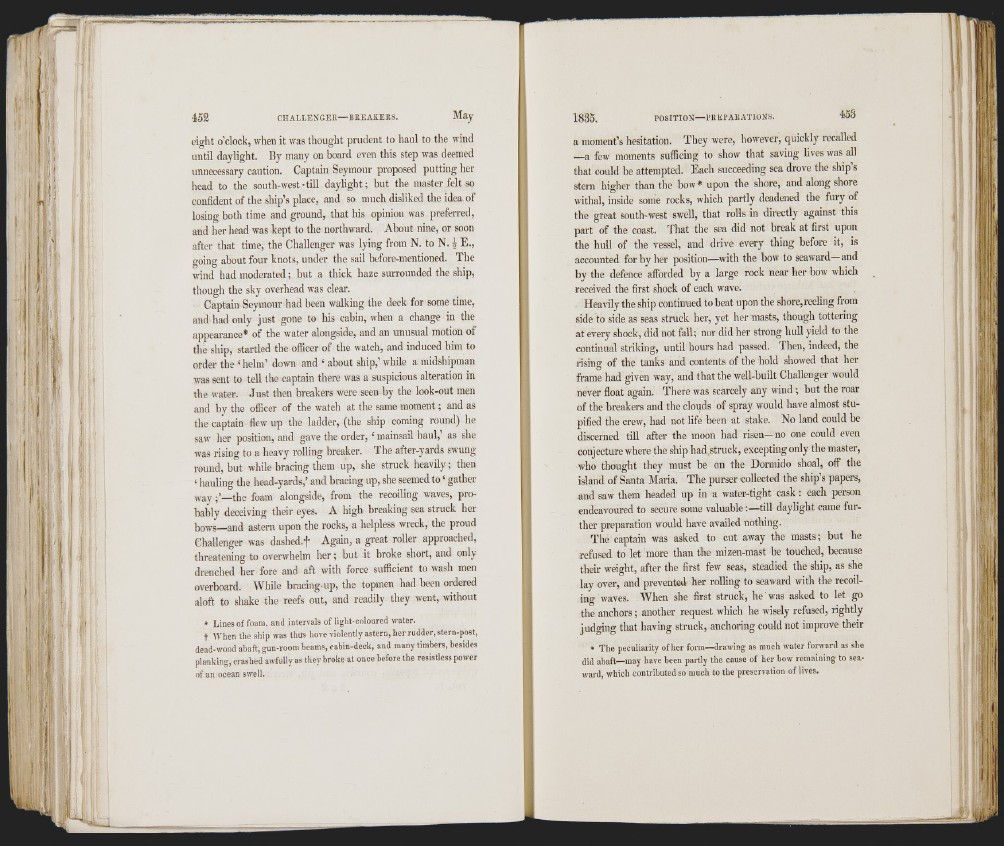
eight o’clock, when it was thought prudent to haul to the wind
until daylight. By many on board even this step was deemed
unnecessary caution. Captain Seymour proposed putting her
head to the south-west-till daylight; but the master felt so
confident of the ship’s place, and so much disliked the idea of
losing both time and ground, that his opinion was preferred,
and her head was kept to the northward. About nine, or soon
after that time, the Challenger was lying from N. to N. i E.,
going about four knots, under the sail before-mentioned. The
wind had moderated; but a thick haze surrounded the ship,
though the sky overhead was clear.
Captain Seymour had been walking the deck for some time,
and had only just gone to his cabin, when a change in the
appearance* of the water alongside, and an unusual motion of
the ship, startled the ofiicer of the watch, and induced him to
order the ‘helm’ down and ‘ about ship,’ while a midshipman
was sent to tell the captain there was a suspicious alteration in
the water. Just then breakers were seen by the look-out men
and by the ofiicer of the watch at the same moment; and as
the captain flew up tbe ladder, (the ship coming round) he
saw her position, and gave tbe order, ‘ mainsail haul,’ as she
was rising to a heavy rolling breaker. The after-yards swung
round, but while bracing them up, she struck heavily; then
‘ hauling the head-yards,’ and bracing up, she seemed to ‘ gather
yfg^y ;’_ th e foaffl alougsldc, from the recoiling waves, probably
deceiving their eyes. A high breaking sea struck her
bows—and astern upon the rocks, a helpless wreck, the proud
Challenger was dashed.# Again, a great roller approached,
threatening to overwhelm her ; but it broke short, and only
drenched her fore and aft with force sufficient to wash men
overboard. While bracing-up, the topmen had heen ordered
aloft to shake the reefs out, and readily they went, without
• Lines of foam, and intervals of Ught-coloiired water.
t When the ship was thus hove violently astern, her rudder, stern-post,
dead-wood abaft, gun-room beams, cabin-deck, and many timbers, besides
planking, crashed awfully as they broke at once before the resistless power
of an ocean swell.
a moment’s hesitation. They were, however, quickly recalled
—a few moments sufficing to show that saving lives was all
that could be attempted. Each succeeding sea drove the ship’s
stern higher than the bow* upon the shore, and along shore
withal, inside some rocks, which partly deadened the fury of
the great south-west swell, that rolls in directly against this
part of the coast. That the sea did not break at first upon
the hull of the vessel, and drive every thing before it, is
accounted for by her position—with the bow to seaward—and
by the defence afforded by a large rock near her bow which
received the first shock of each wave.
Heavily the ship continued to beat upon the shore,reeling from
side to side as seas struck her, yet her masts, though tottering
at every shock, did not fall; nor did her strong hull yield to the
continual striking, until hours had passed. Then, indeed, the
rising of the tanks and contents of the hold showed that her
frame had given way, and that the well-built Challenger would
never float again. There was scarcely any wind ; but the roar
of the breakers and the clouds of spray would have almost stu-
pified the crew, had not life been at stake. No land could be
discerned till after the moon had risen—no one could even
conjecture where the ship had struck, excepting only the master,
who thought they must be on the Dormido shoal, off the
island of Santa Maria. The purser -collected the ship’s papers,
and saw them headed up in a watei-tight cask : each person
endeavoured to secure some valuable:—till daylight came further
preparation would have availed nothing.
The captain was asked to cut away the masts; but he
refused to let more than the mizen-mast be touched, because
their weight, after the first few seas, steadied tbe ship, as she
lay over, and preventeil her rolling to seaward with the recoil-
ino- waves. When she first struck, he was asked to let go
the anchors ; another request which he wisely refused, rightly
judging that having struck, anchoring could not improve their
-• The peculiarity other form—drawing; as much water forward as she
did abaft—may have been partly the cause of her bow remaining to seaward,
which contributed so much to the preservation of lives.
ii
¡ I
i
IE
r